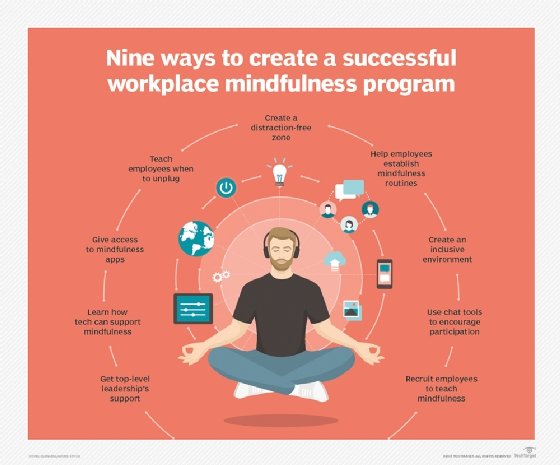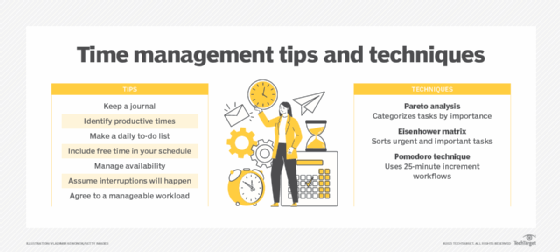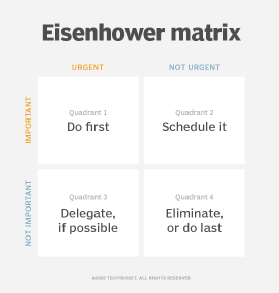time management
What is time management?
Time management is the coordination of tasks and activities to maximize the effectiveness of an individual's efforts. Essentially, the purpose of time management is to enable people to get more and better work done in less time.
Elements of time management include organization, planning and scheduling to best take advantage of the time available. Time management techniques also take into account an individual's particular situation and their relevant capabilities and characteristics.
Why is time management important?
The importance of time management is in its ability to assign meaning to time, letting people make the most of their time. In a business context, it is used to set goals and expectations for companies and their employees. Good time management skills help employees deliver quality work and meet their goals effectively. Time management also helps managers to understand what employees are capable of and to set realistic goals.
Poor time management skills cause employees to miss goals and deliver poor work, become overly stressed out and anxious, and run short of time. When time is used inefficiently, it has deleterious effects on employees, management and the company.
Time poverty is a result of poor or nonexistent time management. People find themselves in this state when they have too much to do and too little time to do it. Their personal lives suffer, and they feel increasingly overwhelmed with responsibilities and activities despite working hard.
Time management requires active decisions about what a person wants to do. Without time management, individuals continually react to external stimuli and lose a sense of control over their work and lives.
All work takes time, but some tasks are more valuable than others. Reallocating time to higher-value work improves both productivity and work-life balance. Good time management creates a healthier workplace overall.
Benefits of time management
The benefits of effective time management apply equally to the business and its employees. Some of these benefits include the following:
- Happier employees. When employees have enough time to get their work done, they are happier and less prone to burnout.
- Improved creativity. When not stressed by time issues, employees have the space and energy to be more creative in their work. They can actively engage with their work instead of passively reacting to it. This increases innovation.
- Lower absenteeism. Stressed and burned-out employees take more sick and other time off.
- Lower turnover. With a better work experience, employees are likely to stay at a job and not look elsewhere.
- Increased productivity. Employees who are less likely to be absent and who enjoy their work are more productive.
- Enhanced reputation. Businesses that encourage effective time management are known as good places to work, improving employee recruitment and retention.

Challenges of time management
Mallary Tytel, founder of consultancy Healthy Workplaces, categorizes barriers to effective time management as either internal or external.
Internal barriers are ones that come from the individual and are within the individual's control. They include factors such as the following:
- Lack of self-control. An individual who lacks self-control is prone to distraction and might miss goals because of this.
- Procrastination. People put off tasks until they feel pressured to complete them. This is a reactive behavior.
- Lack of motivation. An individual might not see the reason for completing something, choosing to do something else and setting other goals.
- Anxiety. Individuals experiencing stress likely find it harder to focus and be decisive.
- People pleasing. A person who is preoccupied with pleasing everyone inevitably fails because other people have conflicting needs; the individual will spread themselves too thin trying to please them all.
- Multitasking. Trying to do too many things at once, or Multitasking, can mean failing at all of them.
These internal factors relate to an individual's habits, behaviors and actions. Though the behaviors might be unconscious or ingrained, an individual has the power to moderate their behaviors and change the way they use time.
External barriers are factors that come from outside the individual. They include factors such as the following:
- Workload. An individual can end up with more work than they can handle.
- Job constraints. The job or workplace might keep the individual from reaching their goals.
- Lack of corporate resources. A company might not provide the resources employees need to complete their jobs. For example, it might be a remote-only position, but the company doesn't provide collaboration tools for team members to work well remotely.
- Distractions. External life factors, such as a family emergency or a global pandemic, might disrupt an individual's ability to manage their time effectively. Basic time wasters such as social media can also be a time suck.
External barriers, unlike internal ones, are not within the individual's control. They come from the outside environment. However, the individual can control how they react to these barriers.
Time management tips and techniques
Below are a few tips for achieving better time management:
- Keep a journal of activities for a week to identify the times of day that are likely to be most productive. Use that information to guide scheduling tasks.
- Take time at the start of each workday to make a to-do list of measurable goals and methods of reaching them.
- Schedule daily tasks according to priority and include unscheduled time in the day.
- Manage your communication availability. Open email and instant messaging applications at scheduled times rather than engaging with them all day.
- Follow other email management best practices, such as processing your email in batches and organizing messages to be dealt with at a later time.
- Assume periodic interruptions will happen and add time to specific tasks to allow for them.
- Manage your workload. Don't agree to more work than you can comfortably do and discuss unreasonable demands with management.

Below are some time management techniques and tools:
- Pareto analysis. Based on the Pareto principle, Pareto analysis states that 80% of consequences come from 20% of causes. It is useful for categorizing courses of action according to their importance or value in a given context. It helps people use resources efficiently.

- Eisenhower matrix. The Eisenhower matrix is a tool to help with prioritization that divides tasks into urgent tasks and important tasks. The goal is to get people to prioritize more important tasks over less important but more time-sensitive ones that take attention from the important ones.
- Time blocking. Time blocking is a time management method that divides the day into specific blocks of time.
- Getting Things Done method. The Getting Things Done method is an approach to task management that helps individuals stop overthinking big and small tasks, and start prioritizing them, with the goal of reducing stress levels to increase productivity and clarity of thought. It involves writing everything down, categorizing it by importance and then doing the tasks.
- Pomodoro technique. The Pomodoro technique breaks time into 25-minute time slots of focused work interspersed with five-minute breaks, with a longer break after four consecutive work intervals. This helps people resist the urge to procrastinate and multitask.
- Productivity apps. Productivity apps can be used to set reminders and create schedules.
Time management and management theory
Many of the time management techniques are used in project management to help teams reach their goals.
Below are some broader theories and concepts related to time management strategies:
- Parkinson's law. The amount of work required to complete a given task will expand to fill the time allotted to the task, according to Parkinson's law.
- The 70% rule. By conserving energy, people can achieve better productivity while working at a less intense pace, according to the 70% rule.
- Hofstadter's law. A task always takes longer than estimated to complete, according to Hofstadter's law. People overestimate the benefits of a system -- in this case, the individual's capacity to work under a time constraint.
- Pickle jar theory. The pickle jar theory is a visual metaphor to illustrate the fact that a person's day can be filled with many small, unimportant things that take away space from the important things.
Time management is an integral component of business process management (BPM), which involves streamlining workflows to increase efficiency. Like time management, BPM comes with its own set of challenges. Check out these seven impediments to business process efficiency and how to fix them.